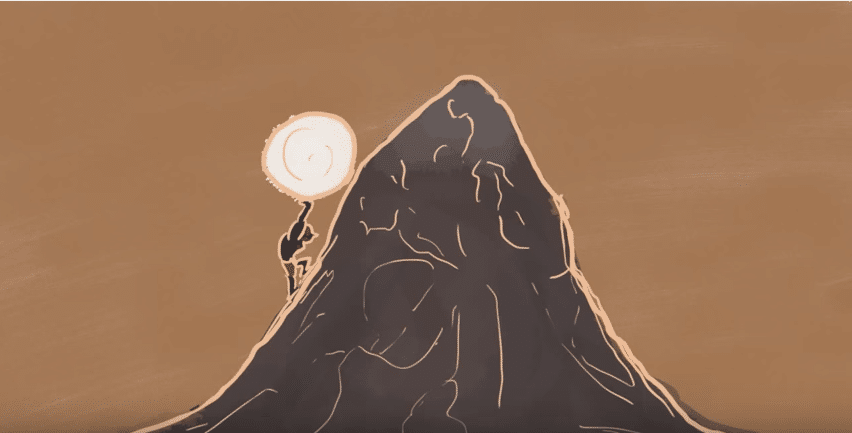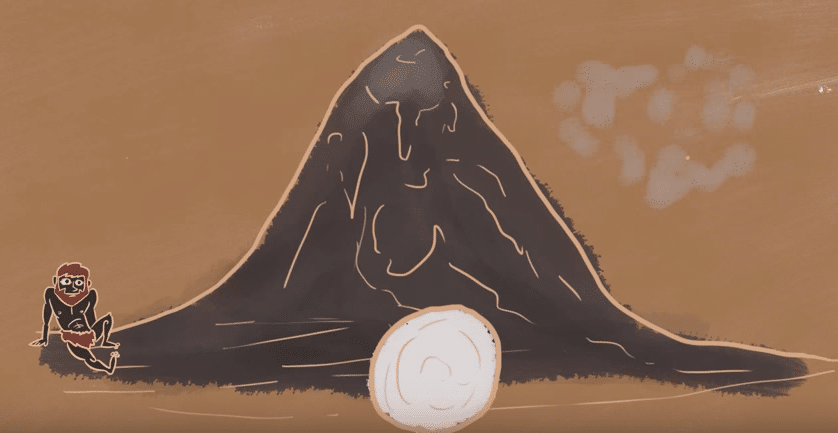
Do you ever feel like you’re just rolling the rock uphill?
As I face that huge to-do list of things-that-have-to-be-done, I’ve been thinking about Sisyphus, the hero of Albert Camus’s famous 1942 essay, The Myth of Sisyphus. Camus described Sisyphus, a mortal in Greek mythology, who offended the gods and was punished by being condemned to roll a rock uphill for eternity. Each time Sisyphus reached the top of the hill with his rock, its weight would send it cascading back down the hill. For Camus, the myth demonstrated man’s existential plight, and the absurdity of having to do work that is futile, day in and day out. (Watch Peter Dronen’s animated film here.)
That’s how I feel in the springtime when life and all the weeds return to my garden. The gods warned me (through a number of gardening colleagues) not to plant such a huge garden, but I, as a proud, inquisitive, and energetic mortal, decided to defy them. I created something way bigger than I can manage. During the springtime, I weed one area one day, then move on to the next, return in a week to the first, to find, guess what? A new set of weeds has taken over and my work must begin again. Like Sisyphus, I will never get it all done.
Should I just throw in the spade and crumple into a pile of (unwanted) buttercups?

An actress friend of mine from New York City has a different take on the matter. When she heard how overwhelmed I was feeling trying to manage our property, she laughed. “Oh, you get used to that living in New York City. Every day there’s so much you can do in The City, but you realize that you will never do most of it. You get used to knowing that what you do will only be a smidge, compared to what you can’t do.”
A lightbulb went off! I saw that I had been believing that I should get it all done. It was as if my life was constructed around a huge game called “accomplishing all there is to do.” But I had forgotten that I’d chosen the game. Maybe there’s a different game out there called “it will never be done and much of what lies ahead of me will never get finished.” Sure, there are responsibilities in life, like mine to my family and clients, that have to get done; I am accountable for managing these. There are consequences for not doing some things. Yet I’m the one who chose many of the obligations on this man-made mountain I have chosen to climb.
Awareness may be the first step in recovery. But I still need strategies that can help me navigate the absurdist drama before me. I’m experimenting with these.
Stop and smell the roses. Or the peonies. Or the unwanted buttercups.
The peonies are blooming in the garden and they are luscious beyond belief. Their intoxicating perfume lifts me out of my hopelessness about the garden. The weeds can wait. Checking into my here-and-now sensory experience, helps me bypass my mind’s diagnosis of “there is too much to do.”
Get some perspective.
Have you ever been sick, really sick, when even doing the simplest task seems out of reach? When I’ve been laid low by sickness or hurt in an accident, one of the gifts I’ve received has been to watch the list of what I expect from myself miraculously shrink. When I am able to leave my bed, I delight in what I can do, such as make my first cup of tea, in the face of all that I can’t.
I want to remember that perspective, that gratitude, as I get swept back into the rhythm of regular life.
Track your real accomplishments.
On the surface, this can seem like returning to the land of the ever-present to-do list, checking things off the list, and watching how new items magically spring up to replace what you’ve checked off. But I’m talking about a different kind of reflection.
This week, I discovered a little software app called “Idonethis.com” that allows you to track accomplishments. (It’s free in its hobby-personal version , and requires almost no learning curve.) You can either list tasks and check them off (the old way) or pause a moment, reflect, and record what you accomplished that matters most to you.
For example, my big accomplishment on Tuesday was not tied to any goal. It was a surprise insight that came out a conversation with one of my former podcast guests. “Don’t try to write another career book about working in the 3rd act of life. Connect working with the kind of questions of meaning that show up in writers like Parker Palmer and Richard Rohr.”
One five minute insight meant more to me than a mountain of to-do’s done. And taking a moment to record this was very satisfying, a glimmer of meaning I could take from my work.
Meditate. Become more mindful.
This is a longer-term strategy, so I won’t write about it here, although I know it’s the door into a way of being that is not dependent on the world becoming fixed, ordered, or behaving as it should.

Camus was interested in finding meaning in an absurdist world where the tasks of life seemed overwhelming and futile. (And if you need to practice feeling the absurdity of life, just turn on NPR and listen to the news out of Washington, D.C.)
He thought the world was godless. I don’t agree, but I appreciate his wrestling with the question “why bother” in the face of the craziness of life. His essay closes with Sisyphus accepting his fate and the absurdity of his work, finding, within his choice, the possibility of happiness.
Accepting that part of life that may always seem a bit futile, absurd, and at times overwhelming, seems wise.
Take that you forest of weeds.









